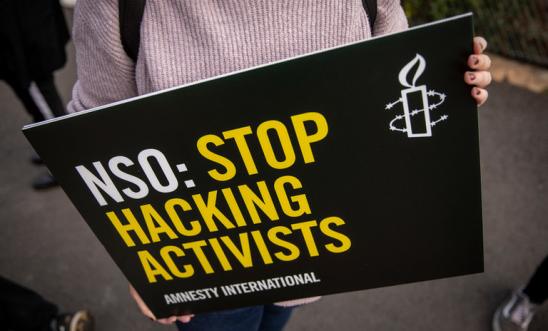Spyware: Fresh call for ban ahead of major summit in Costa Rica

Notorious Pegasus spyware just one form of highly-intrusive technology which campaigners believe poses serious threat to human rights
Meeting comes after hacking of phones belonging to heads of state, journalists and human rights activists
‘It’s a simple fact that highly-invasive spyware poses a real danger to the privacy and security of everyone’ - Rasha Abdul Rahim
Ahead of today’s opening of RightsCon, a major summit on human rights in the digital age taking place in San José in Costa Rica, Rasha Abdul Rahim, Director of Amnesty Tech, said:
“The spyware crisis has massive implications for the future of human rights.
“Highly-invasive spyware has become the weapon of choice for governments seeking to silence journalists, attack activists and crush dissent, placing countless lives at risk.
“It’s a simple fact that highly invasive spyware poses a real danger to the privacy and security of everyone.
“Governments around the world must take action to stop unscrupulous spyware companies selling their wares, and to stop phones being turned into weapons.
“There must be an immediate global ban on highly invasive spyware.”
Monitoring cyber-surveillance
Amnesty’s Security Lab monitors and investigates companies and governments who abuse cyber-surveillance technologies and pose a fundamental threat to human rights defenders, journalists and civil society. Its investigations have revealed the relentless spread of NSO Group’s Pegasus spyware, which has been used to target heads of state, activists and journalists in Spain, Poland, the Dominican Republic and across Latin America, the Middle East and Africa.
In a significant first step to address the spyware crisis, in March US President Biden signed an executive order restricting the US government’s use of commercial spyware technology.
However, Amnesty is insisting that the US and governments around the world go further and impose a total ban on highly-invasive spyware. Amnesty defines “highly-invasive spyware” as software with functionality that cannot be limited and the use of which cannot be independently audited, of which Pegasus is just one example. For spyware that can be limited and independently audited, Amnesty also calls for a global temporary ban on its use until a system of human rights safeguards is put in place to prevent abuses.
Amnesty at RightsCon
Each year, RightsCon brings together activists, business figures, policy makers, technologists and journalists from around the world to take action on human rights in the digital age. The 12th annual meeting will be taking place in San José in Costa Rica between 5-8 June 2023. Go here for more information on AmnestyTech sessions at RightsCon.
No comments:
Post a Comment